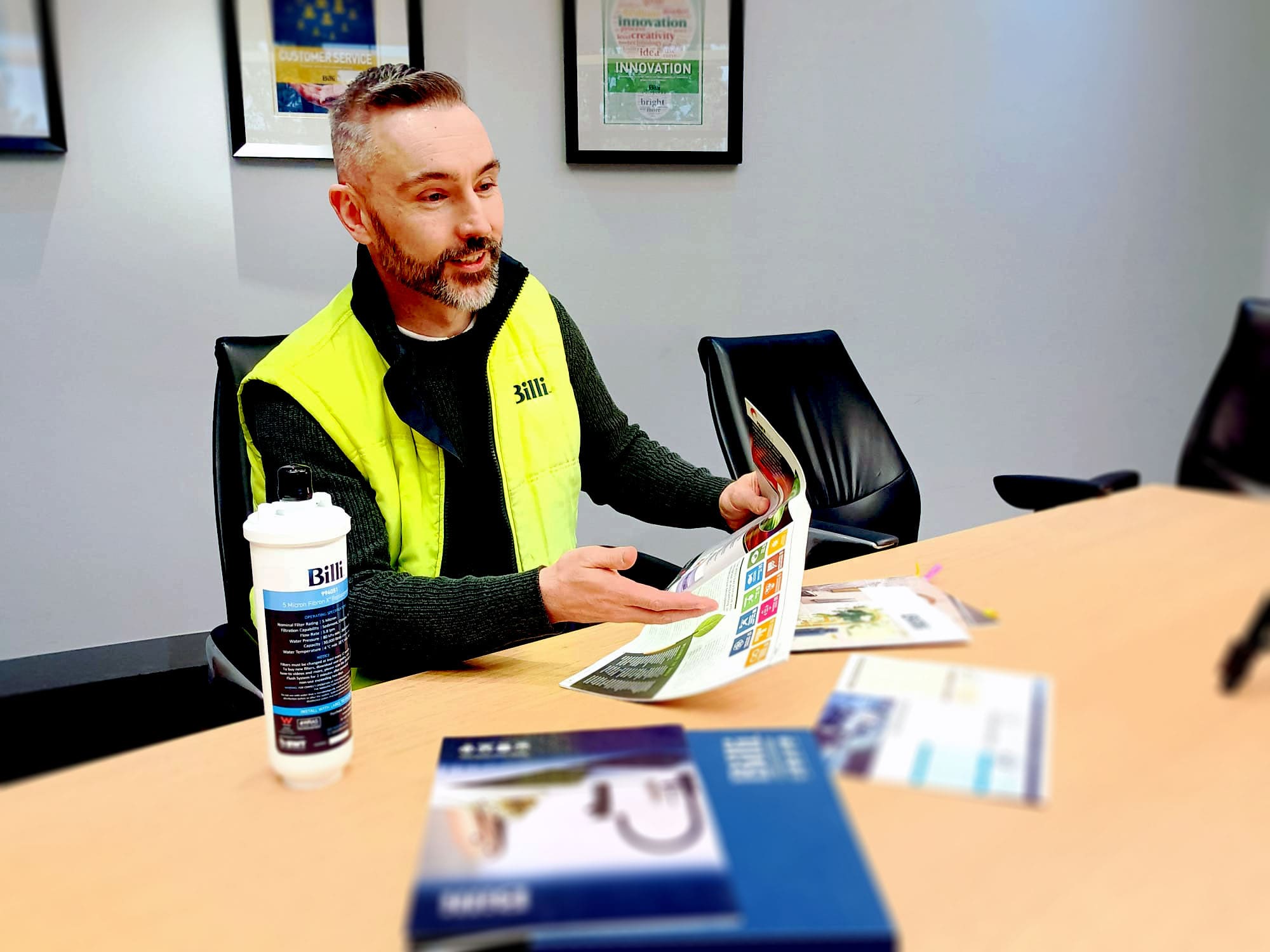Newest
Popular
Products
Can’t find what you are looking for, please call 1800 812 321 or email us on info@billi.com.au
Billi Media
Interview with Fergus Tough, Billi’s Director of Manufacturing Operations
Fergus Tough’s journey at Billi is marked by engineering excellence and environmental stewardship. He is driven by a deep passion and unwavering purpose to bring about meaningful change. In this discussion, Fergus explores Billi’s proactive sustainability approach and discusses how data-driven insights, early adoption of green technologies, and a company-wide commitment to change are shaping a brighter future.

How long have you worked at Billi, and what drew you to the company?
I’ve been with Billi for six years now. When I first joined as a Senior Manufacturing Engineer, I was attracted by the opportunity to make a positive impact. Billi’s commitment to innovation and its forward-thinking culture was a perfect fit for me. On a personal level, I have always tried to do what I can to minimise my impact on the environment. Billi is the first company I have worked at that has incorporated sustainability as part of the company ethos.
And what does your current role at Billi entail?
As Director of Manufacturing Operations, I oversee a wide range of departments, including Production, Quality, and Supply Chain. About 18 months ago, I also took on the role of Billi’s ESG program manager, responsible for initiating our ESG reporting.
Setting up a robust ESG program from scratch must have been a challenge. How did you approach it, especially considering Billi’s acquisition by Strix in late 2022?
The support from our parent company, Strix, was crucial. While Billi had a history of environmental initiatives, Strix provided the structure and expertise to enhance our efforts. I closely collaborated with Matt Thomas, the Engineering and Divisional Operations Director at Strix, and his guidance was essential in helping me navigate the complexities of ESG reporting.
Sustainability has always been a personal passion, and this role allowed me to formalize my knowledge. It was interesting to see how my work and personal life aligned – learning about solar panels and green energy at work while implementing them at home! This hands-on experience, along with Matt’s insights, helped me understand the complexities and translate them into actionable steps for Billi. The open communication and collaborative spirit fostered by Strix and Matt have been crucial to our progress, including our shift towards data-led decision-making.
And how did this shift inform Billi’s sustainability agenda?
In 2023, Billi established the framework for its Environmental, Social, and Governance (ESG) initiatives and embraced a data-driven sustainability approach. Aligned with the United Nations’ Sustainable Development Goals (SDGs), Billi’s approach concentrates on seven key goals within “the 3Ps”: People, Product, and Place. Collaborations with esteemed organizations such as the International Well Building Institute and GreenTag, coupled with a strong emphasis on WELL certifications, recycling capabilities, and product waste energy capture, serve as a direct manifestation of our commitment to the SDGs.
At the heart of these partnerships, initiatives, and sustainability endeavors lies a data-driven decision-making process. For example, Billi’s collaboration with Custom Fleet facilitates the gathering of crucial data on fuel consumption and vehicle usage, illustrating how this data-centric approach empowers us to establish ambitious targets, monitor progress, and identify areas for enhancement.
Data clearly plays a crucial role in Billi’s sustainability strategy.
Of course! It’s crucial to have a data management system in place to avoid bias. We’ve realised the importance of data for making informed decisions and measuring progress. We’ve been consistently collecting data on different aspects of the business, like waste management and energy consumption. This enables us to set ambitious targets and track our sustainability performance more effectively.
What are Billi’s main areas of focus in 2024?
This year, we’ve achieved a significant milestone at our Thomastown manufacturing facility by transitioning to 100% renewable electricity. We accomplished this by utilizing a combination of solar energy and GreenPower-accredited Renewable Energy Certificates (RECs). Additionally, we’re offsetting the carbon emissions from our company vehicles through the use of carbon credits, ensuring that our Scopes 1 and 2 emissions are also 100% renewable. This puts us ahead of the recommendations outlined in the Paris agreement.
Looking ahead, our primary focus is on reducing Scope 3 emissions and working towards carbon neutrality. We are actively integrating sustainability into all aspects of our operations, including product development, supply chain logistics, manufacturing, partnering with local suppliers, and transitioning to recycled and biodegradable packaging solutions. It’s important to note that 94% of our Scope 3 emissions are ‘in-use’ emissions, influenced by the decarbonisation rate of electrical grids. This emphasizes the significance of our ambitious internal targets and our commitment to achieving ISO 14001 Environmental Management and ISO 45001 OH&S Management accreditations by 2024, followed by ISO 50001 Energy Management in 2025. These accreditations will drive our sustainability efforts and minimize our environmental impact as we address the complexities of Scope 3 emissions.
Our products consume water and electricity, and we are actively seeking opportunities to create value while reducing our carbon footprint. Our focus is on efficiently capturing relevant data and leveraging expertise to achieve this goal. Our technical specialists are continuously innovating to reduce our impact, such as through the early adoption of ‘green’ refrigerant gases and converting waste heat into a source of heating energy to decrease electricity consumption.
What prompted Billi to adopt these green refrigerants?
Globally, there’s a shift away from using hydrofluorocarbons (HFCs) as refrigerant gases due to their high Global Warming Potentials (GWPs). For example, R134a, which is a common hydrofluorocarbon, has a GWP of 1,430, meaning its greenhouse effect is 1,430 times more than carbon dioxide over a 100-year period. In contrast, hydrocarbons (HCs) like R290 have GWP below 5.
While there is no current legislation or requirement for us to stop using HFCs in our domestic markets, we chose to adopt HCs early on because it’s best practice and to be able provide service to some of our export markets, such as the UK and EU, where such requirements are already in force. Being proactive aligns with our environmental responsibility, and we’ve invested significantly in infrastructure and training to ensure a safe and seamless transition.
It’s clear that commitment to early adoption underpins all facets of Billi’s business.
To me, sustainability means considering the impact of our actions early on, whether it be in product design, logistics and supply, ethical sourcing or even investment. And so, it’s essential for Billi to keep sustainability front of mind during key decision-making processes. It can no longer be an afterthought, and people in senior leadership positions – like myself – have an obligation to ensure we only accept the highest level of sustainable practices.
Early adoption of HC refrigerants is one example. The refrigerant cooling cycle is a complex process with many factors to take into account early on, including the design of the product and the amount of gas used. But when the gas, design, and pressures are balanced correctly, we can achieve superior cooling performance and reduce energy consumption – and that’s what our engineers are always working on optimising.
And how does this attitude affect new product development?
We consider sustainability factors in our new product development research. We ensure that all our units undergo field testing to proactively investigate real-world conditions for any unexpected behaviors across all our product lines. This process of pre-emptive problem-solving allows us to address any potential unforeseen issues before the product reaches the customer.
Of all Billi’s sustainability initiatives, which one are you particularly excited about?
With an engineering background and keen eye for data, I’m most excited about being able to further optimise our products’ energy consumption. Billi’s under-the-bench products rely on electricity and while we already have sophisticated energy-efficient systems in place, we continue to explore new ways to optimise and improve our products.
How does fostering a culture of awareness within the company fits into Billi’s sustainability agenda?
Having that strong culture is absolutely crucial, and it all starts with strong leadership and consistent messaging, followed by the integration of sustainability into employee objectives and business goals. We also want to encourage everyone at Billi to make small but meaningful changes in their daily routines. It’s about creating habits – turning off equipment when not in use, making conscious waste disposal choices. These actions may seem insignificant but when everyone gets on board, they contribute significantly to our overall sustainability goals.
Finally, what significant sustainability shifts do you foresee in the industry in the coming years?
The momentum around sustainability is undeniable. Companies worldwide are realising they must embrace sustainability to thrive. While the industry has made great strides in the environmental space, including the use of renewable materials, there is still a long way to go.
We can expect a surge in the rise of electric vehicles and the market for them to continue growing. Improved battery technology will bring about cheaper and more reliable long-range options, leading to a significant reduction in emissions related to business travel. At Billi, we’re excited to be at the forefront of this movement, setting a high bar for environmental responsibility and inspiring others to follow suit.
KEY HIGHLIGHTS:
Fergus Tough’s leadership at Billi has been essential in driving the company’s sustainability approach and initiatives.
Thank you Fergus!

CATEGORIES
ARCHIVES
- March 2025
- February 2025
- January 2025
- December 2024
- November 2024
- October 2024
- September 2024
- August 2024
- July 2024
- June 2024
- May 2024
- April 2024
- March 2024
- February 2024
- November 2023
- September 2023
- June 2023
- April 2023
- March 2023
- January 2023
- December 2022
- November 2022
- October 2022
- July 2022
- June 2022
- April 2022
- March 2022
- January 2022
- December 2021
- November 2021
- October 2021
- September 2021
- August 2021
- July 2021
- June 2021
- November 2020
- June 2020
- February 2020
- January 2020
- November 2019
- October 2019
- September 2019
- July 2019
- April 2019
- March 2019
- February 2019
- November 2018
- May 2018
- February 2018
- October 2017
- May 2017
- January 2017
- October 2016
- September 2016
- April 2015
- March 2015
- November 2014
- October 2014



